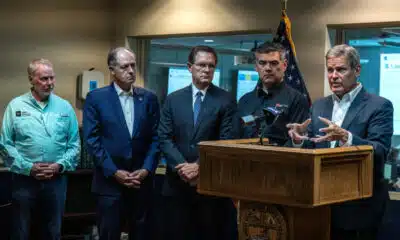News from the South - Kentucky News Feed
After living outdoors for weeks, she got a place to sleep, a shower — and a job
by Liam Niemeyer, Kentucky Lantern
May 21, 2025
This story is the second of four parts in a series about homelessness in Western Kentucky.
CENTRAL CITY — When Courtney Phillips left her friend’s home in Muhlenberg County on Halloween last year, she took with her what she could fit into a backpack along with a leash for her dog Joker. The two of them walked roughly four miles to the county courthouse in Greenville.
The 32-year-old had been fired from her job at a nursing home in Madisonville, she said, because she didn’t have reliable transportation or a phone to let her employer know when she lacked a ride. She had been raised to be independent and take care of herself but had few options. A tornado in 2021 whose path stretched for over a hundred miles had wrecked her late father’s home in Bremen and left it uninhabitable.
A case manager she had worked with saw her on the side of the road, stopped and drove her to a church she had been attending for a couple of months. She said others with nowhere to go had slept in the parking lot of Abundant Life Church in Central City without fear of running into law enforcement.
Phillips found a corner and laid down two quilts and her sleeping bag and put her comforter on top. Her backpack served as a pillow and Joker as a source of warmth. She slept there for weeks, angry and hurt that circumstances had dropped her on cold concrete.
“If I’m out of sight, I’m out of mind,” Phillips told the Lantern. “I’m used to making things happen, and nothing was happening.”
As the nights grew colder, Jennifer Banks, one of the church’s pastors, watched Phillips and others sleeping outside through the church’s cameras. A van often parked there overnight. Police in late September had brought wheelchair-bound Mallie Luken to the parking lot and left her to sleep the night. Banks encouraged Phillips to stay in sight of the cameras so she could watch her for her safety.
After Thanksgiving, when overnight temperatures dropped into the teens, Jennifer’s husband Zachary brought blankets and hand warmers for Phillips and Joker, planning to place a small heater next to them. Phillips was unaware at the time, but Zachary saw that her lips were blue.
“We’re going to the church and letting her in. She’ll freeze to death,” Jennifer Banks recalls thinking. Her church hadn’t considered using their building as a shelter at that point.
Only four days after Phillips began staying at the church she landed a job at another nursing home, the pastor said. She’s still staying in a room at the church, walking and bicycling to work.
“All she needed to do is be able to sleep at night and get a shower, and she got a job,” Jennifer Banks said.
Phillips is grateful for the help she has received from the Bankses and others. As for some in the local community, she says, “They try to sweep us under the rug like we don’t exist.”
A loose coalition emerges
Zachary Banks and Jennifer Banks each had their own personal struggles before moving their family to Muhlenberg County in late 2023. The pastor of their “mother church” in Hardin County, also called Abundant Life, had called the couple to lead the new church in Central City. They bought a building that had been home to a Presbyterian congregation.
Zachary Banks had been in and out of prison while struggling with addiction, and Jennifer Banks had dealt with alcoholism. How their Christian faith helped them overcome those challenges informed how they wanted to build their new church community.
“If I can share my experience, if I can share my testimony with people like, ‘Listen, you don’t want to sit in a prison room for seven years,’” Zachary Banks said earlier this year. “I treat the people the way that I wish that somebody would have treated me.”
The two of them, with members of the previous congregation coming along, started talking about their vision and going out into the community, hosting picnics and weekly meals at the church and delivering food. One weekend they helped clean up trash at a local park. They saw people experiencing homelessness, some dealing with substance abuse, and invited them to come to church for food.
The church sought and received a grant from the Felix Martin Foundation, which funds initiatives in the county, to build a mobile shower outside the church.
The Bankses and their church aren’t the only ones who know people experiencing homelessness and want to do more.
Debra Gorham, the director of the Hope2All food pantry in Drakesboro in southern Muhlenberg County, distributes boxes of food to hundreds of families who line up in cars at her pantry. Some have unstable housing situations or live outside. Every Kentucky county is required to have an animal shelter, Gorham told the Lantern in April. But there is no such requirement for people.
“Something about that just doesn’t sit very well with me,” Gorham said.
Kelsey Rolley, a community services coordinator with the agency Pennyrile Allied Community Services, or PACS, in Greenville, fields requests for aid from people dealing with housing, utility bill assistance and more, relying on federal Community Services Block Grant funds to meet those needs.
But the funding can run out quickly as people struggle to afford rents of $1,000 a month or more, she said, for houses that still need repairs or are not up to code. People are “having to take what they can get.” Emergency shelters in other nearby counties face high demand. The people she helps, whether they have a disability or other issues, often need recurring help.
“I don’t think it would ever be enough for just PACS alone to be able to carry the weight of the burden that we are seeing down here, whether it be the homeless, whether it be just resources in general — everybody’s having to spread them out thin, because the demand is so high,” Rolley said earlier this year. “If we don’t have enough resources as a community to carry our own — if we can’t help our own, how are we supposed to grow as a population?”
Putting her faith in ‘Beacon of Hope’
Gwen Clements, a Central City woman, started a Facebook group focused on homelessness and has worked with the Bankses, Rolley and others as a part of a loose coalition of the caring.
In the summer 2024, law enforcement officers serving a warrant came to a large encampment. Later, at the property owner’s request, police cleared the encampment, scattering the roughly dozen people who had been living there, some of whom Clements considers friends.
Clements took to Facebook angry at how the campers had been treated.
“They’ve been living there for many months without ANY ISSUES!! The encampment is well hidden from public eye, so it’s not an eyesore for the city,” she wrote on Facebook in June 2024. “WHERE ARE THEY SUPPOSE TO GO??? Some of them work in town at local restaurants and walk to work…JUST WHAT ARE THEY SUPPOSE TO DO??”
She threatened to let the displaced campers pitch tents in her front yard “with a huge sign explaining why they are there” for people to see on their way to the dedication of statues of local musical heroes The Everly Brothers and John Prine in downtown Central City.
She said a Central City police officer came to her house shortly after her Facebook post to advise her against that, saying a city ordinance prohibited pitching tents in one’s yard.
With Clements’ help, some who had lived in the encampment rented rooms at the Central Inn, a motel at 300 East Everly Brothers Blvd. Clements’ Facebook group members sometimes send her money to put up people at the Central Inn to keep them out of dangerous cold.
Clements wants to do more. In her vision the county would have a shelter, community kitchen and space for people experiencing homelessness.
The Central Inn — and its possibilities — came into focus as a possible solution as support began to gather around an idea floated by Abundant Life Church: Buy the Central Inn and turn it into apartments where people without housing can stay, pay rent and build financial stability and a credit history, before moving on to another rental elsewhere in town. Other services would be provided by local agencies to help those dealing with mental illness and other issues.
The church posted on Facebook about the proposal and Clements, a supporter of the idea, shared the post with her Facebook group.
The church called it the “Beacon of Hope.”
Next in the Lantern’s series: In a meeting with local officials and downtown business owners, the “Beacon of Hope” faces pushback.
Previously in ‘No Kentucky Home’
Part 1: Homeless often means ‘invisible,’ but not to everyone in this small Kentucky town
YOU MAKE OUR WORK POSSIBLE.
Kentucky Lantern is part of States Newsroom, a nonprofit news network supported by grants and a coalition of donors as a 501c(3) public charity. Kentucky Lantern maintains editorial independence. Contact Editor Jamie Lucke for questions: info@kentuckylantern.com.
The post After living outdoors for weeks, she got a place to sleep, a shower — and a job appeared first on kentuckylantern.com
Note: The following A.I. based commentary is not part of the original article, reproduced above, but is offered in the hopes that it will promote greater media literacy and critical thinking, by making any potential bias more visible to the reader –Staff Editor.
Political Bias Rating: Center-Left
This content presents a thoughtful and empathetic examination of homelessness in a small Kentucky community, highlighting grassroots and faith-based efforts to provide support and housing. It emphasizes community solidarity, social services, and addressing systemic issues like housing affordability and lack of resources for vulnerable populations. The focus on social support programs, community activism, and a critical viewpoint on the insufficiency of current resources and policy aligns with a center-left perspective, advocating for more proactive, compassionate social policies and local engagement without strong partisan language or ideological extremism.
News from the South - Kentucky News Feed
Online Rockcastle County program gives students learning flexibility
SUMMARY: Rockcastle County Schools in Kentucky continue their online learning program, now in its sixth year since starting during the pandemic. Designed for students in sixth grade and above, the program offers flexibility for those facing challenges with in-person attendance. District leaders emphasize that while in-person learning remains the preferred method, virtual education provides a valuable alternative for unique situations. The program resets each semester, allowing students to switch between online and in-person learning as needed. Families must sign a contract to commit to the program’s expectations, ensuring students benefit fully from this adaptable educational option in a digital world.
This school year marks the 6th year of the program, which began due to the pandemic.
Subscribe to FOX 56 News on YouTube: https://www.youtube.com/c/FOX56News/?sub_confirmation=1
Stay informed about central Kentucky news, weather, and sports! Follow FOX 56 on our website and social channels:
https://www.FOX56News.com
https://www.youtube.com/c/FOX56News
https://www.facebook.com/FOX56News
https://twitter.com/FOX56News
https://www.instagram.com/FOX56News
https://www.linkedin.com/company/FOX56News
News from the South - Kentucky News Feed
Wisconsin Man Sentenced for Illegal Firearm Possession
SUMMARY: Alexander Laykovich, 27, from Milwaukee, Wisconsin, was sentenced to 48 months in prison by U.S. District Judge Karen Caldwell for unlawful possession of firearms despite being adjudicated as mentally defective in January 2023, which barred him from owning guns. He was stopped in Stanford, Kentucky, in January 2024, while carrying body armor, knives, a recording device, and eight firearms. Further searches revealed 15 more firearms and explosive device parts. Laykovich will serve 85% of his sentence and face five years of probation. The case involved cooperation among federal, state, and local law enforcement agencies and prevented potential violence near Fort Knox.
The post Wisconsin Man Sentenced for Illegal Firearm Possession appeared first on lexingtonky.news
News from the South - Kentucky News Feed
Kansas man accused of child sex crimes in Kentucky
SUMMARY: A Kansas man, 41-year-old Justin R. Bevitt of Topeka, is accused of meeting and engaging in sexual activities with a 15-year-old Kentucky girl. Kentucky State Police began investigating after receiving a report of a juvenile leaving home with Bevitt. The investigation revealed multiple past encounters between Bevitt and the minor. With help from the Warren County Commonwealth Attorney’s Office and the Kansas Bureau of Investigation, authorities searched Bevitt’s Topeka residence on August 22, leading to his arrest. He faces charges including procuring a minor, unlawful transactions, and distributing sexual material involving a minor. Extradition and additional charges are pending. The case remains under investigation.
The post Kansas man accused of child sex crimes in Kentucky appeared first on www.wnky.com
-
News from the South - Alabama News Feed6 days ago
U.S. agriculture secretary announces end to subsidies for solar panels on farmland
-
News from the South - Kentucky News Feed6 days ago
First of its kind clinical trial offers new hope for Kentuckians at risk of dementia
-
News from the South - West Virginia News Feed7 days ago
Free AI testing platform rolled out to federal employees
-
News from the South - Georgia News Feed7 days ago
Don't eat this shrimp sold at Walmart due to possible radiation contamination: FDA
-
News from the South - Arkansas News Feed6 days ago
Cities across the US are embracing AI guidelines for local government workers
-
News from the South - Alabama News Feed5 days ago
Grants to boost local emergency alert systems in question as public media agency closes
-
News from the South - Arkansas News Feed5 days ago
‘Alligator Alcatraz’ probed by Dems as ICE detention centers multiply in states
-
Our Mississippi Home6 days ago
MSU Unveils Mixed-Use Development Featuring Boutique Hotel, Cultural Landmark












































